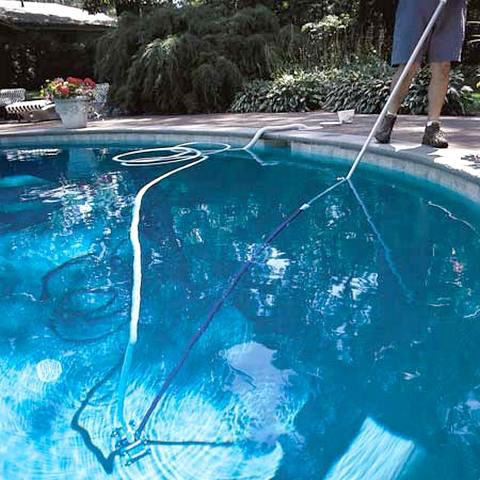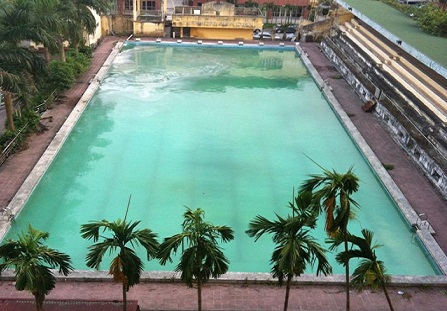How does chlorine solution clean the pool?
When going to the pool, we often hear the smell of the pungent odor of chlorine gas.
How does chlorine solution in swimming pools work?
Chlorine gas was first discovered by Swedish chemist Carl Wilhelm Scheele in 1774. Today, chlorine is one of the most produced chemicals in the world with its application to a multitude of products. Chlorine is closely related to many industry applications in human daily life.

People often produce chlorine by electrolysis of sodium chloride (NaCl) salt . The chlorine gas collected will be used to create other chlorine compounds used to disinfect, bleach, produce plastics and related products.
In pools , chlorine used to remove lake water from bacteria can be harmful to humans. Chlorine kills bacteria through a fairly simple chemical reaction. Chlorine solution when dissolved in water decomposes into hypochlorous acid (HOCl) and hypochlorite ion (OCl-). Both of these substances kill microorganisms and bacteria by attacking the lipid layer of the cell wall and destroying enzymes and structures inside the cell that cause them to oxidize and become harmless. The difference between HOCl and OCl- is their oxidation rate. Hydrochloric acid is capable of oxidizing microorganisms in seconds, while hypochlorite ions can take up to 30 minutes.

The activity of HOCl and OCl- changes according to the pH of the pool. If the pH is too high, not enough HOCl in the pool, the cleaning process may take longer than usual. The most ideal pH in a swimming pool is between 7 - 8, but 7.4 is ideal because this is also the pH of human tears.
After HOCl and OCl- have completed the process of cleaning the pools, they will combine with other chemicals, such as a compound with nitrogen or ammonia or broken down into single atoms and inactivated. Sunlight also contributes to speed up these processes. Therefore, it is necessary to continue adding chlorine to the pool so that the cleaning process is continuous. In addition, chlorine also plays an important role in drinking water treatment technology to eliminate bacteria and algae in dirty water, bleaching clothes and utensils.
However, in addition to the very useful bacteriostatic properties of chlorine, it also has some side effects that can be annoying for people that can even be dangerous. Chlorine has a very special smell that is quite uncomfortable even at high concentrations, which makes it difficult to breathe. In addition, chlorine can cause irritation to some skin types that cause itching and burning . The hypochlorite ions make many fabrics faded and frayed quickly if not cleaned immediately after leaving the pool.
Therefore, today, some companies have developed some other chemicals to replace chlorine. However, until now chlorine is still the optimal solution for sterilization, bleaching with high efficiency and cheap price.
- The more the pool smells, the more dirty the chlorine is
- Outbreaks of diarrhea caused by bacteria spread in the pool in the United States
- Exposing the truth is easily tricked into swimming pool water
- Simple tool to measure the safety of drinking water
- The secret of swimming pool water contains toxins
- The pool in the sky is super unique
- Robot cleaning pool
- The Olympic pool was still green and now began to stink
- Robot cleaning the pool
- Atomic memory stores all books in the world in a stamp
- Clean the pool with plastic balls
- He built the deepest pool in the world
 'Fine laughs' - Scary and painful torture in ancient times
'Fine laughs' - Scary and painful torture in ancient times The sequence of numbers 142857 of the Egyptian pyramids is known as the strangest number in the world - Why?
The sequence of numbers 142857 of the Egyptian pyramids is known as the strangest number in the world - Why? History of the iron
History of the iron What is alum?
What is alum?